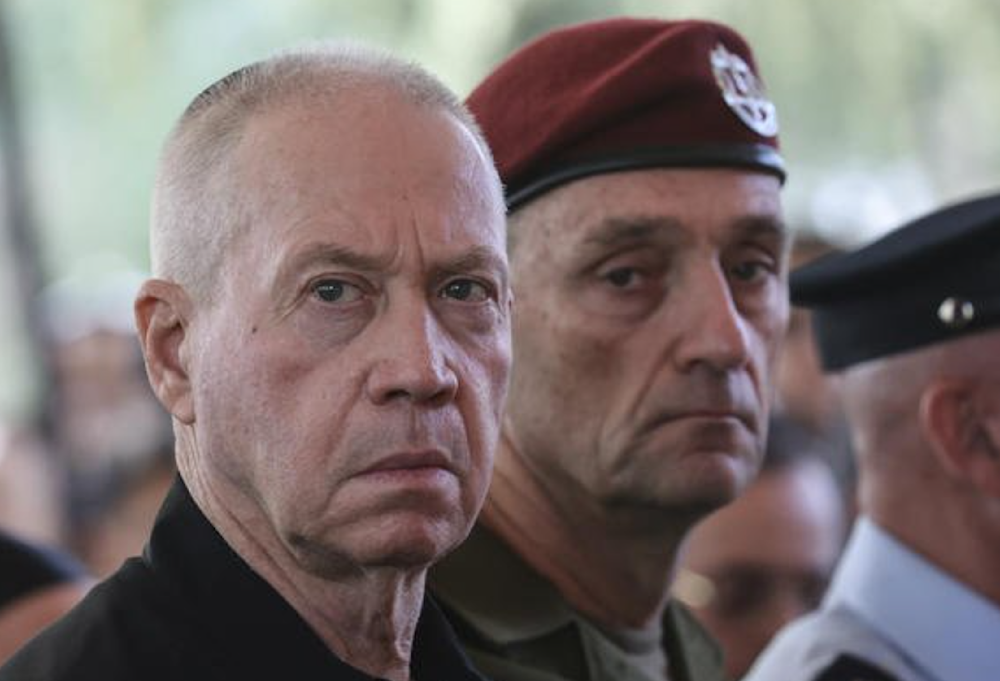Netanyahu's office gathered sensitive footage of Gallant, IOF member
Netanyahu's office has refuted the allegations, calling them "defamatory fabrications" and a "witch-hunt".
-

Former Israeli Security Minister Yoav Gallant and Chief of General Staff Lieutenant-General Herzi Halevi in occupied Palestine on October 27, 2024. (AP)
Several reports on Thursday night stated that Israeli Prime Minister Benjamin Netanyahu's office had independently obtained sensitive security camera recordings of both recently sacked Security Minister Yoav Gallant and an IOF officer who worked at the Prime Minister's Office, citing unknown reasons.
Netanyahu has called for an urgent investigation into a series of security leaks involving "state secrets" since the start of the war on Gaza, which have sparked a growing scandal, implicating officials within the premier's office, including his security spokesperson.
Netanyahu's office refuted the allegations, calling them "defamatory fabrications" and a "witch-hunt".
Multiple Israeli news agencies, including Haaretz, Ynet, Kan, and others, stated that IOF Chief of Staff Herzi Halevi was warned some months ago that the PMO possessed "sensitive" footage of a top military official who had collaborated with the office. According to accounts, Halevi was warned that the tape had been utilized in problematic circumstances.
According to Israeli Channel 12, two top personnel in the office are suspected of removing critical material from surveillance cameras for unexplained reasons. Meanwhile, Ynet said that "embarrassing" footage of Gallant had been gathered showing him in October 2023 being denied access to a cabinet meeting.
A senior source told Ynet that Netanyahu and his aides tried to undermine Gallant during the war on Gaza by excluding him from security meetings. Netanyahu's spokesperson, Jonatan Urich, allegedly obtained the footage of the incident and shared it with several other people before holding onto it.
Israeli authorities have launched two investigations into the PMO's security leak. According to the Kan public broadcaster, an insider familiar with the investigation revealed that the leaked documents compromised operations aimed at retrieving Israeli captives, putting the lives of soldiers at risk.
Yedioth Ahronoth's web portal, Ynet, stated that four individuals arrested in connection with this breach had served in a covert unit tasked with preventing leaks and "safeguarding state secrets." Among the detainees is a reserve officer with the rank of major, as well as Eli Feldstein, the spokesperson for Netanyahu's office.
The majority of the case's specifics remain under wraps, but reports in Israeli media suggest that the investigation is related to charges earlier this year that transcripts of crucial cabinet sessions and security briefings were tampered with.
According to Israeli Channel 12, police conducted a very uncommon raid on Netanyahu's office on Saturday night, however, the network did not specify which inquiry was involved.
Earlier this year, Ynet reported that top figures in the security establishment were concerned that efforts were being made to rewrite the minutes of wartime conversations with Netanyahu after uncovering differences between transcripts of the meetings and what the officials had heard in real-time.
Thousands of Israelis protest Netanyahu's policies, Gallant sacking
Following the sacking of Yoav Gallant from his position as Security Minister by Israeli Prime Minister Benjamin Netanyahu on Tuesday, Israeli protesters took to the streets once again to demonstrate against the decision.
Thousands gathered in occupied al-Quds for the second night in a row on Thursday, gathering near the Knesset and calling for Netanyahu to reverse the decision.
Israeli settlers are also demanding that Netanyahu reach a deal with the Palestinian Resistance to secure the return of Israeli captives in the Gaza Strip.
Gallant said these are the main issues that led to disagreements with Netanyahu and his eventual sacking.
Netanyahu claimed that his dismissal of Gallant was due to a breach of trust amid the ongoing war on Gaza, according to his office.
Netanyahu stressed that full trust is "critical" between a PM and a security minister during a war, adding, "Unfortunately, this trust has eroded, and attempts to bridge the gaps have failed."
He asserted that the disagreements were not only made public in an "unacceptable manner" but also reached "Israel's" opponents, who had "derived great benefit" from the matter.
He went on to say that the majority of government and security cabinet members felt the same way.

 4 Min Read
4 Min Read










